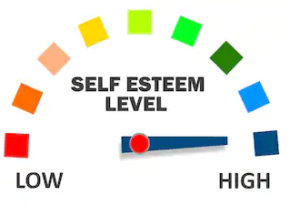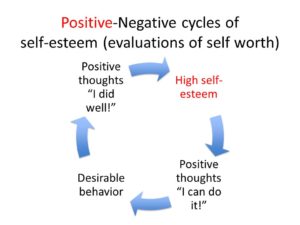 Positive self-esteem is a building block of personal integrity. The way the world treats us is greatly influenced by the way we see ourselves. We have all known people who genuinely like themselves and feel content with their lives. They see the positive in themselves and are able to understand and appreciate the good in other people. They treat others with a sense of respect. This is a skill they know well because this is how they treat themselves. When our feelings about ourselves are positive, we show others that we like and value ourselves. Then others tend to treat us well. However when we have negative feelings about ourselves, so that we are too critical, complaining and pessimistic, others tend to take this attitude toward us as well. How we treat ourselves helps determine how others will likely treat us.
Positive self-esteem is a building block of personal integrity. The way the world treats us is greatly influenced by the way we see ourselves. We have all known people who genuinely like themselves and feel content with their lives. They see the positive in themselves and are able to understand and appreciate the good in other people. They treat others with a sense of respect. This is a skill they know well because this is how they treat themselves. When our feelings about ourselves are positive, we show others that we like and value ourselves. Then others tend to treat us well. However when we have negative feelings about ourselves, so that we are too critical, complaining and pessimistic, others tend to take this attitude toward us as well. How we treat ourselves helps determine how others will likely treat us.
Some people confuse healthy positive self-esteem with audacity or arrogance, a false sense of superiority over other people. True self-esteem means that we do not have to assert ourselves at the expense of other people. Indeed, it is those with underlying negative self-esteem who must resort to the tactic of exaggerating their own worth. Often this is accomplished by putting other people down. Those with positive self-esteem can acknowledge their own worth at the same time that they validate the positive qualities of others.
Techniques for Creating Positive Self-Esteem
 Work on your private thoughts: How we feel about ourselves privately, whether these feelings are positive or negative, influences how we interpret our own actions, the decisions we make in life, the goals we set for ourselves and how we relate to other people.
Work on your private thoughts: How we feel about ourselves privately, whether these feelings are positive or negative, influences how we interpret our own actions, the decisions we make in life, the goals we set for ourselves and how we relate to other people.- Diagnose the cues which lead to negative self-esteem: We have all learned certain responses to triggers that can lead to lowered or increased self-esteem. But we may not be aware of these triggers. Identifying the experiences which influence our self-esteem can take a great deal of work and a genuine commitment to improving the quality of our lives.
 Take good care of yourself and your appearance: Appreciate your own individuality, your own combination of strengths and weaknesses that make you a special person.
Take good care of yourself and your appearance: Appreciate your own individuality, your own combination of strengths and weaknesses that make you a special person.- Examine your relationships with others: Improving one’s self-esteem involves engaging in productive and enhancing relationships with others.
- Learn to meet your own needs: A mature adult life requires integrity. While others may assist you here and there, ultimately you are responsible for meeting your own needs. Acquiring positive self-esteem is essential to this task.
Some Characteristics of People with Positive Self-Esteem
 Taking responsibility for one’s own feelings and actions
Taking responsibility for one’s own feelings and actions- Giving and taking compliments graciously
- Focused on the present and future – learning from the past
- Listening openly to others
- Taking good care of body and appearance
- Making decisions from internal values
- Taking risks and challenging oneself
- Laughing at oneself, but never putting another person down
- Accepting mistakes as part of life, open to feedback
- Listening to criticism without anger, and not necessarily agreeing with the criticism
A trained therapist can help in the task of identifying certain themes which we may not be able to discover through our own efforts. When you are ready to schedule your first appointment please complete our Intake Form and someone will call you as soon as possible.
